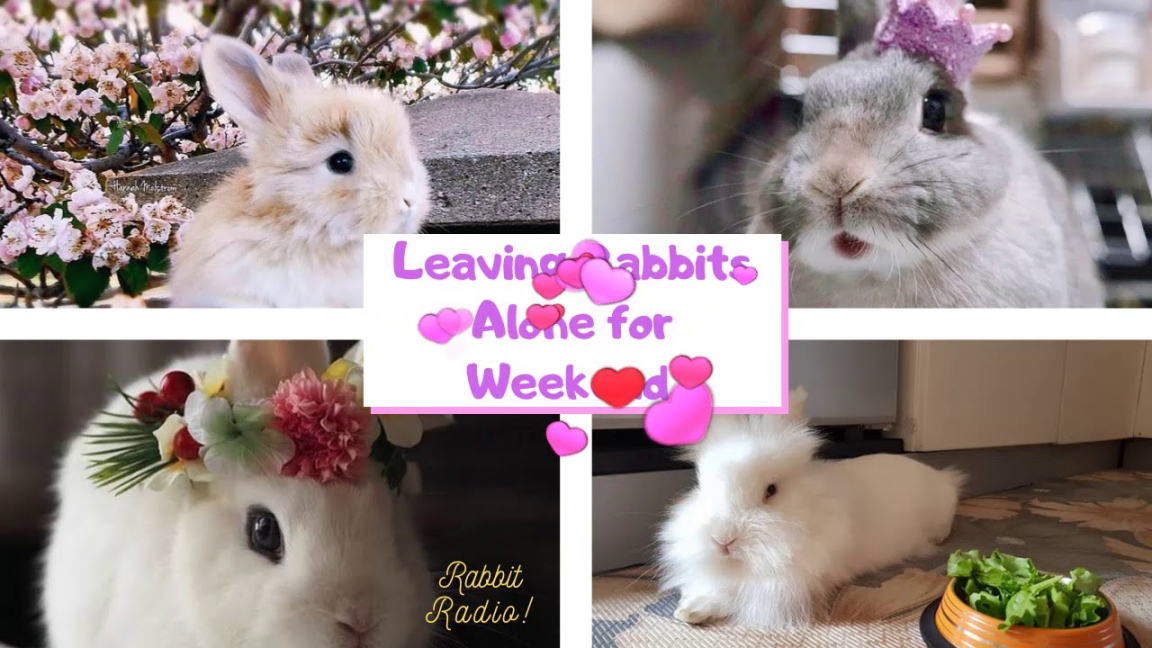How Long Can You Leave a Rabbit Alone?
Rabbits are adorable and sociable pets that require attention and care. Just like any other pet, it is essential to consider their well-being, including their social needs, when planning your schedule. While rabbits can tolerate some time alone, they are generally social animals that thrive on companionship and interaction with their owners. In this article, we will explore how long you can leave a rabbit alone and provide some tips for keeping them happy and healthy during your absence.

How long can a rabbit be left alone?
While rabbits can tolerate being left alone for short periods, it is generally recommended not to leave them unattended for more than 24 hours. Rabbits are intelligent animals and can become bored, lonely, or even anxious when left alone for extended periods. They need social interaction, mental stimulation, and physical exercise to stay happy and healthy.
Factors to consider
Several factors should be taken into account when determining how long you can safely leave your rabbit alone:
- Age: Young rabbits, especially those under six months old, should not be left alone for extended periods as they require more frequent care and supervision.
- Health: Rabbits with underlying health conditions or special needs may require more frequent attention and care.
- Temperament: Some rabbits are more independent and may handle being alone better than others. Consider your individual rabbit’s temperament when planning your absences.
- Living environment: Providing a stimulating and enriching environment for your rabbit, including toys, hiding spots, and space to exercise, can help alleviate boredom and loneliness.
Tips for leaving your rabbit alone
Here are a few tips to ensure your rabbit remains happy and healthy when you need to leave them alone:
- Arrange for a trusted person to check on your rabbit: If you need to be away for an extended period, ask a friend or family member who is familiar with rabbits to check on your pet daily.
- Provide ample food and water: Ensure your rabbit has an adequate supply of fresh hay, vegetables, and water. Consider using food dispensing toys to provide mental stimulation during mealtime.
- Create a safe and comfortable environment: Ensure your rabbit is in a secure and rabbit-proofed area of your home while you are away. Remove any potential hazards and provide a cozy hiding spot for your rabbit.
- Leave engaging toys and activities: Leave your rabbit with a variety of toys, such as chew toys and puzzle feeders, to keep them mentally and physically stimulated during your absence.
- Consider a companion for your rabbit: If leaving your rabbit alone for extended periods is unavoidable, consider getting a companion for them. Another rabbit can provide much-needed companionship and prevent loneliness.
- Spend quality time before and after your absence: Prioritize spending quality time with your rabbit before and after your absence to ensure they feel loved and cared for.
Frequently Asked Questions (FAQs)
1. Can I leave my rabbit alone overnight?
Leaving your rabbit alone overnight is generally safe, provided they have sufficient food, water, and a secure living environment. However, it is best to avoid leaving them alone for consecutive nights.
2. How often should I check on my rabbit when I’m away?
If you need to be away for more than a day, it is recommended to have someone check on your rabbit at least once a day. This ensures their well-being and allows any potential issues to be addressed promptly.
3. Can rabbits get lonely?
Yes, rabbits can experience loneliness and boredom if left alone for extended periods. They are social animals that thrive on companionship and interaction, so it is important to provide them with the necessary social stimulation.
4. Should I get a companion for my rabbit?
If you frequently need to be away or if your rabbit is displaying signs of loneliness, getting a companion rabbit can be beneficial. However, it is important to introduce the rabbits properly and ensure they are compatible before leaving them alone together.
In conclusion, while rabbits can tolerate being left alone for short periods, it is best to limit their time alone to 24 hours or less. They require social interaction, mental stimulation, and a safe environment to thrive. By considering their age, health, temperament, and living environment, and following the tips provided, you can ensure your rabbit remains happy and healthy even when you need to be away.
Related Articles…
Copyright Notice:
The images displayed here are sourced from the internet, with copyrights held by respective owners. For removal of any copyrighted image, please email us.